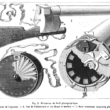Do-Nothing Congress—Our current Congress, upon returning to work after a five-week summer vacation, could follow the lead of Congresses past and whisk through a flurry of bills before leaving town for another month in the run-up to the November midterm elections. But if the last year is any indication, it won’t. The House of Representatives, in particular, “is on pace to shatter all records for inactivity,” wrote the Washington Post‘s Dana Milbank. The 1948 House of Representatives, famously dubbed “do-nothing” by President Harry Truman, passed 1,191 measures in 110 days of session. Today’s 109th House, by comparison, will spend fewer than one hundred days in Washington and will barely approve 400 pieces of legislation, most of them largely insignificant—naming post offices, honoring dead Presidents. The sloth of this Congress may come back to haunt the GOP. In the 1948 election, House Republicans lost 75 seats.
Debates over gay marriage and flag burning, during the summer, trumped any on immigration reform, Congressional corruption, an exit strategy for Iraq, or even assembling a budget for 2007. In its first week back, this September, the House spent considerable time debating a bill banning the sale of horse meat.
GOP leaders, facing their lowest approval ratings in a decade, had hoped to make this month “Security September.” But yet again, the Congressional agenda was long on posture and short on substance. Even on their supposed trump card of defense, Republicans can’t get together. A key group of Republican senators and military lawyers are unhappy about President Bush’s plan to try prisoners at Guantánamo Bay without sharing the evidence to be used against them. A bill to authorize Bush’s warrantless wiretapping program has stalled in the Senate Judiciary Committee, and approval of John Bolton’s appointment as ambassador to the U.N. is on a slow track too.
Confuse and DeLay—No one said defeating Tom DeLay would be easy. But few knew that replacing the Texas representative would be so complicated. A month after pulling out a win in a tough GOP primary, in March, the scandal-tainted former House Majority Leader announced he was leaving Congress. Given DeLay’s decline in public regard, his well-funded opponent, Democrat Nick Lampson, had a seemingly easy road to victory. When DeLay tried to change his legal residency to Virginia and take his name off the ballot, Democrats sued, successfully, to keep him on as the GOP nominee. As a result, local Republicans in Texas had no choice but to rally around Houston city councilwoman Shelley Sekula-Gibbs as a little-known write-in candidate.
As if that wasn’t sufficiently confusing, Governor Rick Perry in early September decided to hold a special election, also on November 7, to fill DeLay’s seat until the start of the next Congress in January, when the winner of the general election would begin the standard two-year term. Lampson, who remains the odds-on general election favorite, chose to skip the special election, but Gibbs and three other conservatives entered the fray. If no candidate wins a majority, there will be yet another election in December—a run-off between the top two vote-getters. A Republican could take the seat, only to be replaced by a Democrat two months later. Not exactly the scenario DeLay had in mind.
Beer Boycott—Beer makers, for whatever reason, have always been loyal Republicans. The Coors family helped launch the modern conservative movement. Anheuser-Busch has long donated generously to Republicans. Miller Brewing Company generally follows suit, and this election cycle gave 63 percent of its political contributions to Republicans. When some of this money went to Representative James Sensenbrenner (R-WI), the chairman of the House Judiciary Committee, responsible for introducing legislation that would make illegal immigration a felony, immigrant rights groups launched a boycott of the Champagne of Beers. Then, several weeks ago, Miller countered by bankrolling an immigrant rights march from Chicago’s Chinatown to Speaker of the House Dennis Hastert’s office in Batavia, Illinois, making conservatives apoplectic. Right-wing pundit Michelle Malkin dubbed Miller the “beer of open borders.” Hastert’s staff urged GOP aides to say no to Miller time at Labor Day barbecues.
The following week, Senate Majority Leader Bill Frist admitted that finding a compromise on immigration reform before the November elections would be “next to impossible.” By that time, if President Bush wants to see an immigration bill passed, he may have to toast a Democratic Congress. Here’s to the High Life.






0 Comments